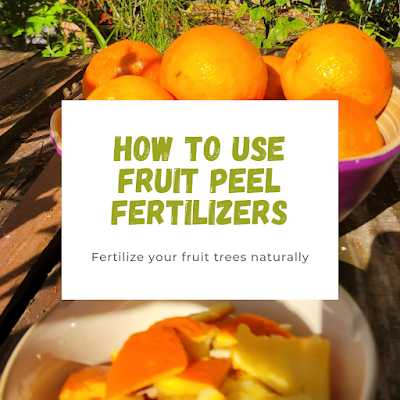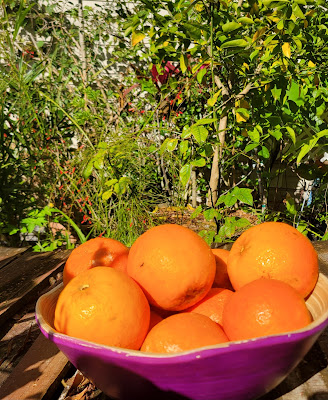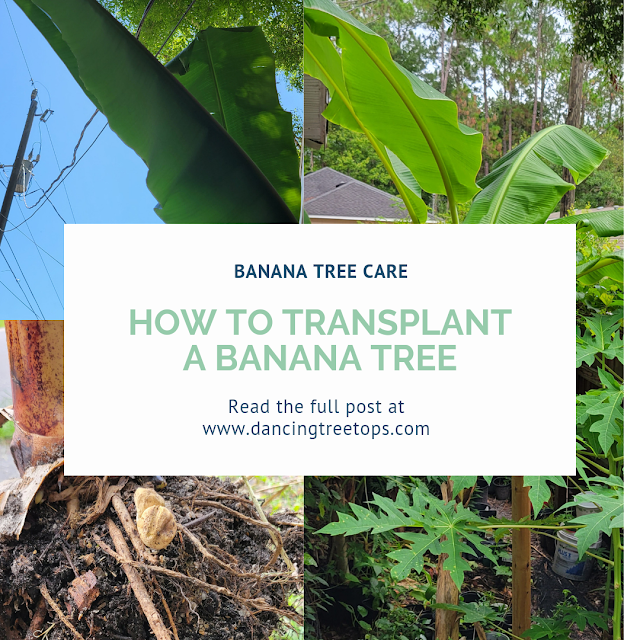- Get link
- X
- Other Apps
- Get link
- X
- Other Apps
When it comes to growing success, I strongly believe in using homemade compost, and if you mix it with composted chicken manure, then you've got the good stuff. We do use these organic fertilizers at times, but if at all possible, we prefer to use fruit peel fertilizers, other natural fertilizers, and compost.
Other than that, we feed our plants a lot of greens. Whenever I cut and prune if it's not turned into new plants, it is either fed directly to plants by simply placing it at the base of a plant, it is composted at the land in our big compost pile, or it is composted at home in our chicken compost pile.
When it comes to fruit trees, I like to give them fruit peels as a natural fertilizer. A fruit peel fertilizer is an obvious way of giving back to a fruit tree the nutrients that we've removed. Apple trees get apple cores and peels, citrus trees get citrus peels, everything gets banana peels, and when it's bloom season I feed tomato plants and fruit trees with banana peel water.
Yes, I use non-organic bananas when I don't have homegrown bananas available.
As a frugal gardener and sustainability proponent, nothing gets wasted.
How to Use Fruit Peel Fertilizers
How To Make Banana Peel Water
- Eat the banana.
- Remove the sticker - Fruit stickers are not biodegradable, and they are often made of ingredients such as turpentine, petroleum, and urea-formaldehyde resins.
- Rinse the peel.
- Soak it in a closed-lid glass jar for 2 - 3 days to help fermentation.
- Pour the water at the base of whatever fruit tree or tomato plant you want to start blooming.
- Discard the banana in the compost bin or at the base of your banana trees.
While I haven't done any long research projects, we've been using banana peel water for several years, and it seems to be working. It is especially notable on tomato plants that are struggling at the beginning of the season.
How To Make Fruit Peel Fertilizers
Our neighbors gifted us a big bag of lemons from their tree, and since these were pesticide-free, non-sprayed citrus, I decided to use them directly on the fruit trees without any prior composting.- Whenever possible use homegrown or organic fruit peels
- Wash non-organic fruit peels well.
- Eat or juice the fruit.
- Remove flesh or seeds (unless you like surprise trees you can't identify)
- Cut the peels into small pieces.
- Throw at the base of the fruit trees.
- Dig the fruit peels down a little or throw some wood chips on top for faster decomposition.,
What Fruit Peels to Use as Fruit Peel Fertilizer
- Banana peel water - anything you'd like to bloom - tomatoes, fruit trees, etc.
- Banana peels are rich in potassium and magnesium, and they also add calcium and phosphorus to the soil.
- Orange peels are rich in iron, zinc, calcium, and citrate.
- Pomegranate peels contain potassium, iron, copper, calcium, phosphorous, and zinc.
- Apple peels are rich in vitamin A, vitamin C, folate, iron, calcium, and phosphorous.
- When I'm juicing elderberries, the chickens get the cooked berries, but the uncooked stems go straight under the elderberry trees as fertilizers.
- In addition to banana peels, orange peels, pomegranate peels, and apple peels, you can use any kind of fruit peel from papaya to mango and more, just make sure to use organic, homegrown, or wash the fruits extremely well first.
So fertilize your fruit trees naturally whenever possible either through homemade compost, fruit peels, or with composted chicken manure mixed in and combine with rainwater and you're all set to get beautiful fruit trees in your garden.
You can learn more about composting here.
Banana Peel Fertilizer
Banana Peel Water
Busy Gardener
Frugal Gardening
Fruit Peel Fertilizers
Gardening Tips
Grow Your Own Food
Growing Fruit Trees
Homemade Fertilizers
Location:
Florida, USA
- Get link
- X
- Other Apps
Popular Posts
Troy-Bilt Wood Chipper - Super Tomahawk = Our No. 1 Tool For Better Composting
We could not have gotten as far with our sustainable land clearing and composting, if it had not been for our power horse, our Troy-Bilt Super Tomahawk wood chipper with its 8 HP Briggs & Stratton motor. We purchased this 31+ year-old wood chipper off Craigslist for $200 about a year and a half ago, and it is still going strong. Troy-Bilt Super Tomahawk Wood Chipper
Zone 9A/9B Gardening Calendar - North East Florida Planting Schedule
Gardening in Florida is a very different experience than gardening in the rest of the country, and growing fruits and vegetables in North East Florida is a very different experience than gardening down south. It has taken us about five years to adjust to the zone 9 planting schedule, and while there are many zone 9 garden guides out there, we felt that there was a need for a simple, user friendly zone 9A/9B planting calendar.
How To Remove Palmetto Palms
If you have ever tried to remove a palmetto palm by cutting it down, you will likely have realized that removing palmettos is tricky. So, when we got ourselves a piece of land with about half an acre of these wonderful palmetto palms, also known as saw palmettos or shrub palmettos, we knew that we had a challenge on our hand.
Where To Find Free Nursery Pots and Planters
Every gardener needs something for their plants to grow in. Whether it is directly into the soil in your garden, into a garden bed, nursery pots, ceramic pots, terracotta pots, or if you get more creative, you need something for your plants to grow in. That's why we're always looking for free nursery pots and cheap planters.
How to Transplant a Banana Tree
Wondering how to transplant a banana tree? I know, it's not a tree, so wondering how to move a banana plant? Bananas are pretty easy to move, and they're pretty hardy too. The best time to transplant a banana plant is in the rain season, but I've planted and re-planted banana plants all year round, just remember to water well if it doesn't rain. Last year I planted a small ice cream banana pup in front of our home, but I was negligent in my research and didn't realize just how big it would get. I prefer moving banana trees in the rain season, but the leaves were getting too close to our power line, so it had to be moved. The roots of banana trees aren't very deep, and they will quickly re-establish, if you give them some love and water. The root ball of a 1 year old Grand Nain banana We've been preparing an area at The Land for banana babies, since we now have six different banana varieties at the house and these are beginning to give us pups. Today was th...
Save Your Papaya Trees After Cold Damage
Papayas are susceptible to high winds and freezes, but do not let that prevent you from growing papayas in zone 9a or 9b. In our experience, papayas are pretty cold hardy, but they do not like temperatures below freezing, especially not a sustained time with freezing temperatures. Temperatures below 40 degrees F/4 degrees C will make the papayas begin to look sad, but it is not until the temperatures hit freezing, that the papaya trees will sustain damage enough to kill the papayas. Last winter we had two quick freezes here in St. Augustine (growing zone 9a), and while our tallest papayas looked sad after the first freezing night, it was not until the second freeze that they were defeated. How to Save Papayas After a Freeze: After a freeze wait and see for a week or two to determine where you need to cut your papayas. If another freeze is imminent before your wait or see period is over, make the cut low, cover and protect. Look for new growth or a firmer trunk. Cut the papaya trun...
How to Grow Mulberry from Cuttings
Our favorite mulberry bush is in danger of eradication, so for the past year or so we have been growing mulberries from cuttings. Our children love eating fruit straight from the trees and bushes, and while we lose wild areas every day to construction and development in our community, we still have a few areas left untouched for now. Some mulberry trees are simply too tall for great mulberry picking, but this one mulberry bush is low and spread thick like a bush. Mulberries look similar to blackberries, but they are sweeter and juicier. They do not hold up well, which is why you will not find them in the stores, but we freeze any leftover mulberries to use in our weekly smoothies. Wild blackberries and wild mulberries We've taken cuttings three times from the mulberry bush. We waited until after fruiting last spring to take the first cutting, and the second time was about four months after fruiting. The third set of cuttings we took was in late winter, just as the mulberry bush had...
How To Make Permanent Plant Tags out of Recycled Plastic, Aluminum & Copper
We have lots of citrus trees in the garden, but until they produce fruits, they will be just that - citrus trees - because I have no clue what type they are, since most of my plant tags never held up. I've tried many different plant tags from chalk signs to plastic and the infamous popsicle stick. All failed the test of time, but when I started selling plants, I had to come up with some way to identify the plants and trees to make it easier for the customers. I wanted something that would last at least 6 months, could stand up against the weather, and I began looking for plastic plant tags. I had a hard time finding affordable, recycled plastic plant tags, so I decided to create my own permanent plant tags . (< see video) We've also begun a complete revamp of our front garden, which means more plants, and we've got lots of plants and trees growing for our future garden at The Land. For these plants, I wanted permanent plant labels that could contain both the common name ...
Finding Free Plants on Craigslist
If you are looking to add new plants to your garden, make sure to keep an eye out for free plants in the free section on Craigslist. We have picked up free plants a few times, when someone is clearing out their garden, and in return we make sure to post items as well. This morning I spotted a post for a free estate sale on Craigslist, and it included potted plants. It was in a fancy neighborhood by the beach, where an old house was being torn down to build a new huge one. We picked up several knick knacks such as plates, vases,paintings, lamps, a coat rack, a book shelf and more, and we also brought home as many big pots and plants as our mini van could fit. Free pots and plants These pots were the big ceramic kind that are not in our teacher's budget, and there were lots of different plants too. The plants need to be re-potted and re-nourished, but we've added some new plant species to our garden, which we will make sure to create more plants from trough seeds and ...
How To Grow Papaya From Seeds
Papaya is one of the easiest fruit trees to grow, if you provide them with the right conditions. Here in North East Florida we are in growing zone 9, and while papaya prefer warmer winters than we have here, we have still had great success. Eat a papaya, grow a papaya. We got the idea to grow papaya from seeds, when one of our children began suffering from constipation. The pediatrician suggested that we added papaya to the diet, because papaya is a diuretic. However, papaya can be expensive often costing $5 for a single fruit, and sometimes papaya can be hard to find at the store. For a frugal family of seven, this means papaya is a luxury, so we now make sure to have papaya trees of all sizes planted around the house. Each papaya fruit has a myriad of seeds, and they are so easy to start. Papaya does not like to be transplanted, although we have been able to do so with varying degrees of success, so plant the papaya directly in the soil outside. If you are in zone 10+, you ...














Comments
Post a Comment